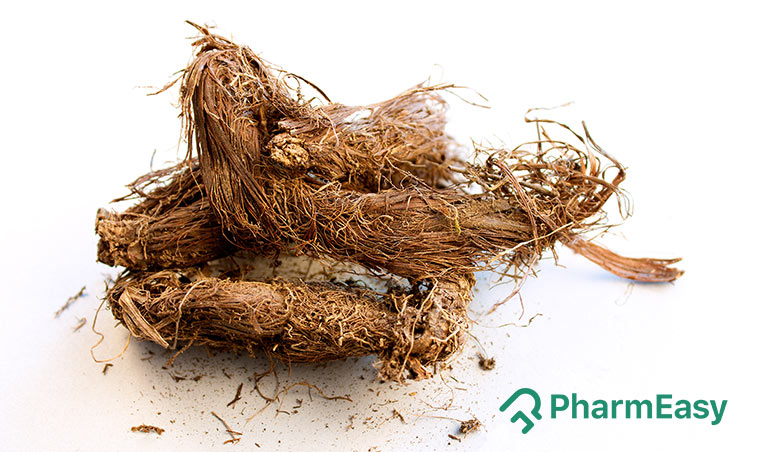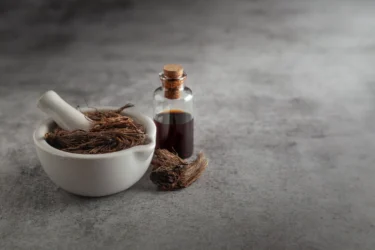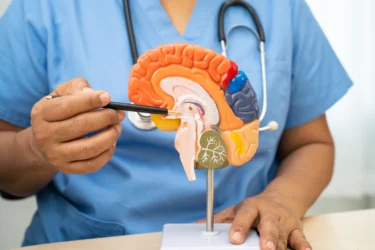Jatamansi (Spikenard): Uses, Benefits, Precautions & More!
By Dr Smita Barode +2 more

Get,

to manage your symptom
Get your,


4 Cr+ families
benefitted

OTP sent to 9988776655



You’ve successfully subscribed to receive
doctor-approved tips on
Whatsapp

Get ready to feel your best.

Hi There,
Download the PharmEasy App now!!


Register to Avail the Offer
Send OTPBy continuing, you agree with our Privacy Policy and Terms and Conditions

Hi There,
Sign up on PharmEasy now!!
Trusted by 4 crore+ families

OTP sent to 9988776655



You have unlocked 25% off on medicines




Code: NU25
By Dr Smita Barode +2 more
Table of Contents
Jatamansi, known as Nardostachys jatamansi, is a small, rhizomatous perennial herb that belongs to the family Valerianaceae. It grows in moist, steep, rocky, undisturbed grassy slopes of India, China, Nepal, and Bhutan1.

Other common names of jatamansi are
The properties of jatamansi are as follows:

The extract of jatamansi was studied1, and it was found to have antidepressant activity, which was determined in the mice model. This suggested that it might be beneficial for people suffering from depression because of sleep disturbances1. However, you must seek advice of a psychiatrist for better advice and prescription for depression.

In a study1 the extract of the rhizome of jatamansi significantly decreased the elevated serum transaminases levels and alkaline phosphatase in an animal model. This may indicate the hepatoprotective potential of jatamansi, however before consuming any herb for conditions related to liver you must consult a doctor for advice as per your conditions.

According to an in vitro study1, the 95% ethanolic extract of the roots of jatamansi exhibited a significant inhibitory effect for the proliferation of cell lines of neuroblastoma. However, these studies are insufficient to establish this claim and to identify its effect on humans. Moreover, cancer is a serious condition and it may require a qualified doctor to diagnose and advice on treatment procedure. You must consult a doctor for any cancer related treatment and seek their advice before taking herbs for their benefits.

The methanolic extract of jatamansi was studied1 for its effect against microorganisms, and it was found to be effective against the majority of the microorganisms and it may justify its role as an antifungal and antibacterial agent. However these studies are insufficient to validate the similar effect of the herb on humans.

In a study1 the extract of jatamansi was observed to significantly help and restore the lipid peroxides and antioxidant enzyme activity to almost normal levels in a rat model. However more studies are needed to identify the effect of the herb on humans. if you or your loved ones are suffering with heart related condition you must consult a qualified doctor for advice.
In my opinion, a regulated intake of jatamansi in your balanced diet might be worth considering. Jatamansi might hold many potential benefits. It may be useful in dealing with hepatitis and liver enlargement issues2.
Dr. Siddharth Gupta, B.A.M.S, M.D (Ayu)

The ethanolic extract of jatamansi was studied7 in a mice model for its potential to enhance memory and learning and reverse amnesia. This may indicate that jatamansi might have some effect on restoring memory and that it may help with dementia. However, the studies are insufficient to indicate the exact effect of jatamansi on humans.

The hydro-ethanolic extract of jatamansi was evaluated for its anti-stress effect due to its antioxidant property in a rat model. This may indicate the potential anti-stress property of jatamansi. However, more studies would be needed to understand to what extent it may be helpful for humans.

The hydro-ethanolic extract from the root of jatamansi was evaluated for its antioxidant and anticataleptic (i.e., against a state of marked loss of voluntary motion in which the limbs remain in whatever position they are placed) activity in a rat model. A significant drop in the cataleptic scores was observed with jatamansi in a study1. We need to consult a doctor for a proper prescription for catalepsy related problem and never try to self-medicate with the help of any herb.

Periodontitis (inflammation of the tissue around the teeth) is a chronic inflammatory disease caused due to bacteria in dental plaque. The bacteria attack the periodontal tissue (composed of the periodontal ligament, gums, and alveolar bone) and damage it.
Some studies suggest that jatamansi might be effective for the management of periodontitis3. However, you must contact a dentist for peridontitis.
According to what I’ve noticed, the traditional use of jatamansi is consuming its rhizome extract. It is believed to have healing properties and might help manage conditions such as jaundice, purify the blood, and address stomach and cardiac diseases. It might be considered a natural remedy passed down through generations for its potential effects5.
Dr. Smita Barode, B.A.M.S, M.S.

Though there are studies that show the benefits of herb in various conditions, these are insufficient and there is a need for further studies to establish the true extent of benefits of herb on human health.
Jatamansi can be used in the following ways:
You must consult a qualified doctor before taking any herbal supplements. Do not discontinue or replace an ongoing treatment of modern medicine with an ayurvedic/herbal preparation without consulting a qualified doctor.
Based on my understanding, the roots of jatamansi can also be advantageous externally. They might be useful for enhancing the complexion, adding a natural glow to the skin. Additionally, it may also help in boosting the richness of the black colour of hair2.
Dr. Rajeev Singh, BAMS
There are no major study that reports any side effects of jatamansi, but every herb may react differently in individuals. More research is required to state the side effects of neem. However, we must consult the doctor before using the jatamansi for its benefits. Kindly do not self-medicate, alter, replace or discontinue any treatment by yourself.
Also Read: Gudmar (Gymnema Sylvestre): Uses, Benefits, Side Effects, and More!
General precautions must be followed if we wish to consume jatamansi. Moreover, it must be prescribed by an Ayurvedic doctor who will understand your conditions and will be able to guide you in the best possible way about dosage and form.
Pregnant women must use jatamansi products with caution, and they should consult their doctor before consuming them in any form.
Also, before using jatamansi for children, the elderly and breastfeeding moms, please consult your Ayurvedic physician.
Also Read: Majuphal (Gall Nuts): Uses, Benefits, Precautions & More!
There is a lack of studies regarding the interactions of jatamansi with other drugs. Therefore, there is a need for more research on this subject. However, you should consult a doctor before using jatamansi along with other drugs. You should make sure to disclose all the current medication being used.
Also Read: Sabudana – Uses, Benefits, Side Effects & Precautions
The powder of jatamansi is made from the roots of jatamansi (Nardostachys jatamansi)4.
Jatamansi has several beneficial effects and is used for its potential effect in cerebral ischemia, epilepsy, and liver damage; its oil may be used to get silky, smooth, and healthy hair; it may relieves symptoms of seizures, vertigo etc. in a fever; in insomnia, mental disorder, heart diseases, and hypertension; it may relieves the phlegm in cough and asthma2. It is best to consult a qualified doctor for advice before consuming jatamansi for its benefits.
Jatamansi oil may be good for hair and it may make your hair silky, smooth, and healthy2.
There is no such evidence of the effects of its consumption during breastfeeding; therefore, you should ask your doctor before consuming it.
There is no such evidence of the effects of its consumption during pregnancy; therefore, you should ask your doctor before consuming it. He will be able to give you best advice as per your condition.
Disclaimer: The information provided here is for educational/awareness purposes only and is not intended to be a substitute for medical treatment by a healthcare professional and should not be relied upon to diagnose or treat any medical condition. The reader should consult a registered medical practitioner to determine the appropriateness of the information and before consuming any medication. PharmEasy does not provide any guarantee or warranty (express or implied) regarding the accuracy, adequacy, completeness, legality, reliability or usefulness of the information; and disclaims any liability arising thereof.
Links and product recommendations in the information provided here are advertisements of third-party products available on the website. PharmEasy does not make any representation on the accuracy or suitability of such products/services. Advertisements do not influence the editorial decisions or content. The information in this blog is subject to change without notice. The authors and administrators reserve the right to modify, add, or remove content without notification. It is your responsibility to review this disclaimer regularly for any changes.
Comments

Leave your comment...
You may also like
Comments